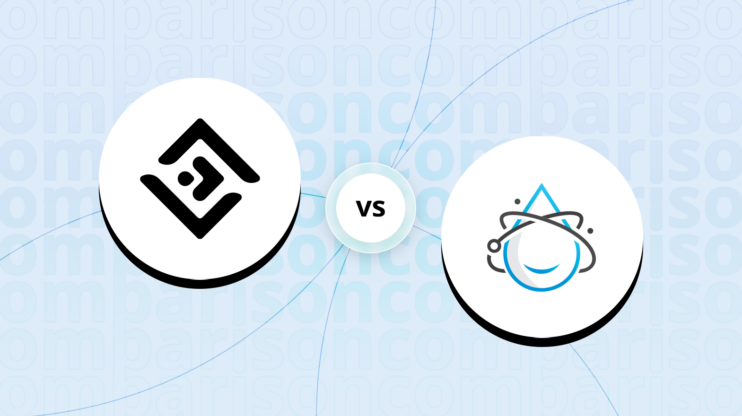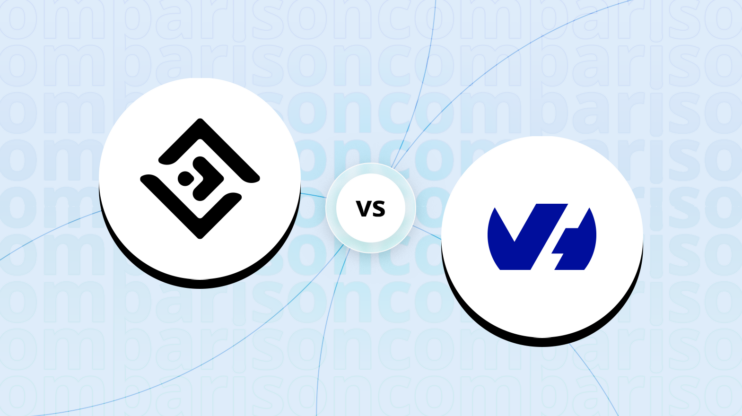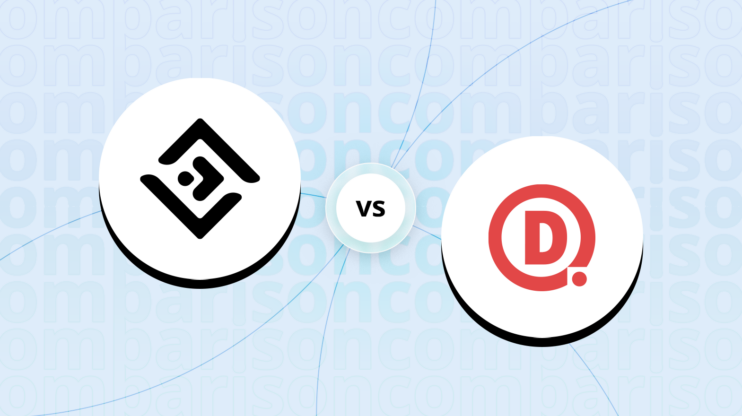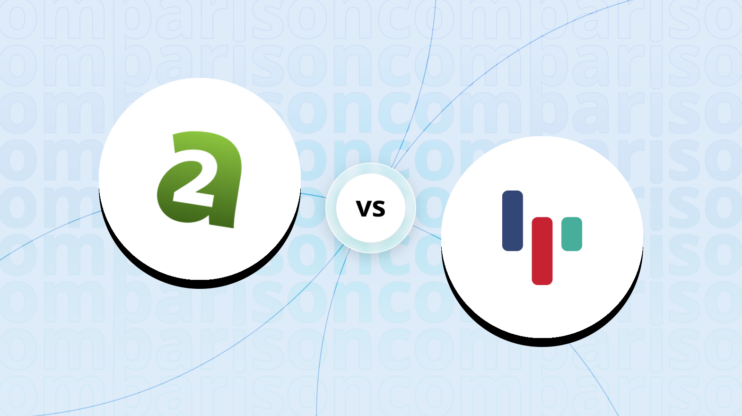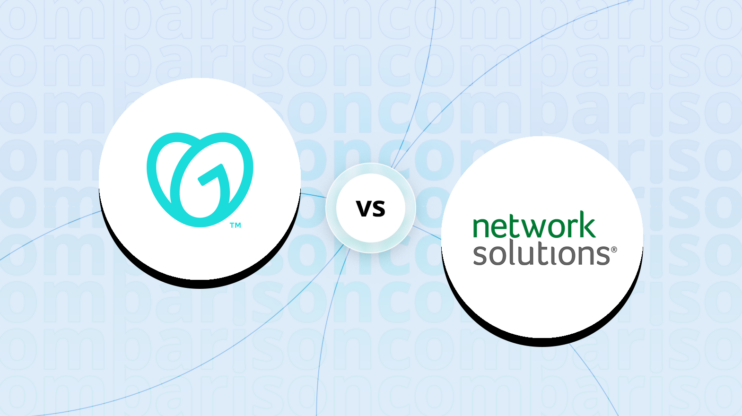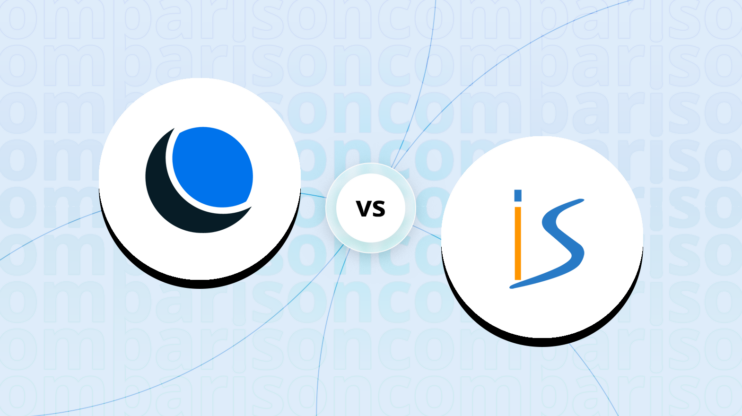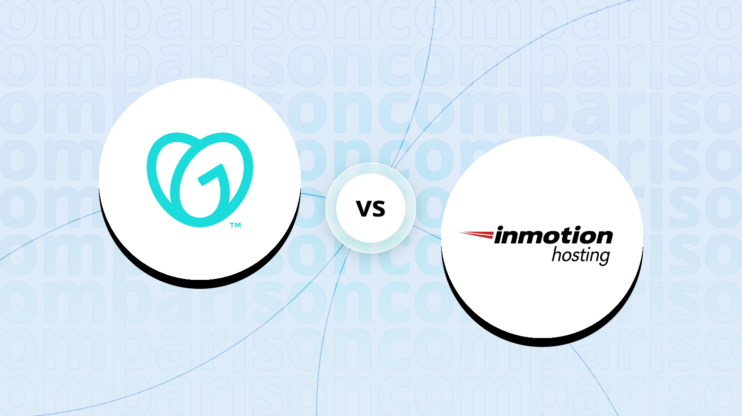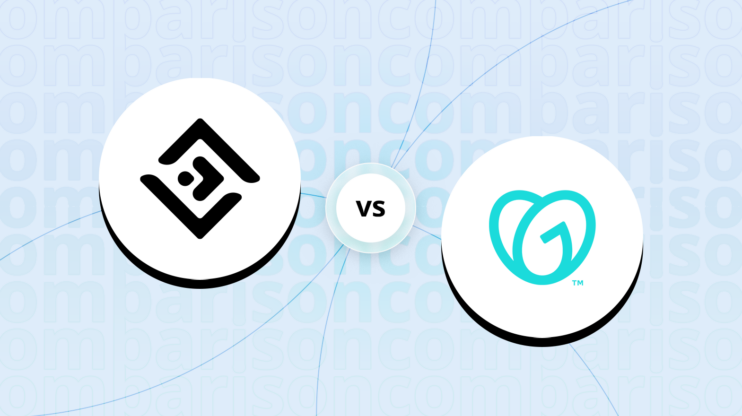Final verdict
Comparing OVH vs. Liquid Web reveals two distinct hosting experiences tailored to different user needs and priorities.
-
OVH (Overall grade: 8.2)
shines with its versatile hosting plans, ranging from shared to dedicated solutions, and strong performance metrics like SSD storage and automatic backups. Its global infrastructure makes it suitable for multimedia-heavy sites, while anti-DDoS protection adds a layer of security. However, past issues with uptime and less stellar customer support may be a concern for some users. OVHcloud’s affordability and broad array of certifications make it an appealing choice for users looking for reliable performance at a cost-effective price point.
Liquid Web (Overall grade: 8.4)
stands out with its impressive uptime guarantees, advanced hardware options like AMD EPYC processors, and extensive managed WordPress and ecommerce hosting plans. Its strong focus on support, highlighted by 24/7 live chat and phone assistance, and proactive monitoring makes it ideal for businesses requiring constant uptime and rapid support response. Though slightly more expensive, Liquid Web’s features such as superior load balancing and specialized solutions for high-traffic and ecommerce websites, justify the investment for users seeking high performance and exceptional service reliability.
 Overall grade:8.2 |
 Overall grade:8.4 |
|
|---|---|---|
| Uptime and Availability | 8.2 | 9.2 |
| Hosting Performance | 7.5 | 7.7 |
| Hosting Security | 9.3 | 9.3 |
| Price | 8.7 | 8.0 |
| Hosting Features | 6.6 | 6.4 |
| Ease Of Setup | 8.7 | 8.7 |
| User Management | 8.9 | 8.3 |
| Customer Support | 7.6 | 9.4 |
| User feedback | 3.3/5 | 4.3/5 |
Hosting types offered
Both platforms provide a variety of hosting types, each designed to meet the different needs of users.
 |
 |
|
|---|---|---|
| Shared hosting | ||
| Cloud hosting | ||
| WordPress hosting | ||
| Ecommerce hosting | ||
| VPS hosting | ||
| Dedicated hosting |
Although both offer a variety of hosting plans tailored to different needs, in
certain cases, one platform may prove to be more suitable.
Detailed comparison
Uptime and availability
Evaluates the average uptime statistics, uptime guarantee and overall availability of the hosting
provider
Score Components:
- Uptime percentage (30%): evaluates the uptime statistics in given period of time
- Uptime guarantee (20%): Assesses if the platform offers an uptime guarantee and
whether the actual uptime matches the promised guarantee. - General performance (25%): Evaluates how fast is the average response time and overall
it’s stability. - Responsiveness (10%): Adaptability to different devices and screen sizes.
- Availability (25%): Reflects the total downtime and number of outages.
 8.2
8.2
 9.2
9.2
🏆 Winner
Liquid Web: Unbeatable uptime guarantees and excellent customer service.

Liquid Web shines with its impressive uptime and availability features. The service guarantees 100% network and power uptime and offers credits for any downtime. Their proactive Sonar™ monitoring and 30-minute hardware SLA underscore their commitment to reliability. Additionally, speedy responses from their customer service team enhance user experience.

On the other hand, OVHcloud offers solid features like global infrastructure and competitive performance metrics. Past issues with uptime have shown improvement, and anti-DDoS protection is standard across plans. They also provide automatic backups, ensuring data security. Despite these features, Liquid Web’s guarantees and customer service set it apart.
Hosting performance
Score Components:
- Hosting speed (30%): This includes SSD quality, Load times, PageSpeed score ranges,
additional information on website speed, built-in plugins for performance enhancement, available caching
methods, and CPU/RAM options - CDN (20%): Considers whether CDN is available or not, whether it’s free or paid, and
the quality of the CDN service - Available data centers (30%): Evaluates the number of data centers and their locations
globally. - Scalibility (20%): Looks at whether elastic scaling is available, the process required
to scale (manual upgrade vs. automatic scaling), the presence of dedicated servers, and the costs
associated with scaling.
 7.5
7.5
 7.7
7.7
🏆 Winner
Liquid Web: Reliable hosting with excellent support and uptime guarantees.
When comparing the general performance of OVHcloud and Liquid Web, we can see distinct differences. OVHcloud offers a range of configurable vCores and RAM with its Performance Web Hosting plan and includes SSD storage, which is good for website speed. However, Liquid Web stands out with its use of AMD EPYC and Intel Xeon processors, offering up to 128GB RAM and NVMe or SSD storage. Liquid Web also provides a 10 Gbps network and gigabit uplinks, contributing to its strong network performance. While OVHcloud includes a basic CDN in its plan, Liquid Web offers built-in SSD and NVMe storage which can significantly improve speed. OVHcloud has unspecified data center locations, whereas Liquid Web’s network is characterized by its high uptime guarantees.
Website Speed
Liquid Web tends to perform better in terms of website speed due to its advanced AMD EPYC and Intel Xeon processors and NVMe or SSD storage. These hardware choices result in faster load times and better PageSpeed scores. OVHcloud’s performance is solid as well, especially with its high vCore and RAM options, but the CDN being basic compared to Liquid Web’s advanced options might make a difference for those needing extreme speed.
Scalability
In terms of scalability, Liquid Web offers some clear advantages. It allows for easy upgrades or downgrades of managed VPS services with limited downtime, and free monthly autoscaling ensures resources match user demands without additional costs. OVHcloud, while offering various vCore and RAM configurations, does not explicitly state if it automatically adjusts resources. Liquid Web also has dedicated servers and clear pricing on the upgrade processes, which adds another layer of confidence for users needing flexible scaling options.
Hosting security
and regulatory requirements
Score Components:
- Technical security measures (40%): This includes encryption, firewalls, DDoS
protection, secure configurations, server monitoring, access control and availability of security addons
(e.g Sitelock security). - Operational security measures (30%): Encompasses data privacy, backups and data
redundancy. - Compliance and certifications (20%): Adherence to legal and regulatory requirements
(e.g., GDPR, HIPAA) and possession of certifications (e.g., ISO 27001, SOC 2). - Business and reliability (10%): Factors in the provider’s reputation, uptime
guarantees, and customer support.
 9.3
9.3
 9.3
9.3
🏆 Winner
OVHcloud: Offers a broad array of certifications, ensuring a high level of security and compliance for various industries.
Both OVHcloud and Liquid Web, have notable differences in their approaches to technical and operational
security, as well as in their compliance with regulations.
Technical security measures:
Both OVHcloud and Liquid Web provide robust technical security measures. OVHcloud includes Anti-DDoS protection by default and has detailed backup and restoration options, along with a firewall on all plans. Liquid Web also offers DDoS protection and firewalls, but emphasizes F5 AIP intrusion detection. OVHcloud provides an SSL certificate with all plans, while Liquid Web highlights SSL options without specifying details. Both providers support PHP versions, though specific versions are not detailed for OVHcloud.
Operational security measures:
OVHcloud operates with advanced multi-site management and extensive API usage for flexibility. It also supports task automation through its control panel. Liquid Web focuses on server protection with features like hardened configurations and real-time monitoring. It includes VPNs for secure connections, which is not mentioned for OVHcloud. OVHcloud’s automated data backups and task scheduling provide a robust operational framework, whereas Liquid Web emphasizes its high availability and 24/7/365 onsite support.
Compliance and certifications:
Both providers align with GDPR and HIPAA standards. OVHcloud has an extensive list of certifications including PCI DSS, ISO 27001, and SOC 1, 2, 3. Liquid Web complies with PCI and GDPR, and self-certifies under the EU-US Privacy Shield. OVHcloud’s compliance extends to health, financial, and environmental standards, showing a broader compliance scope.
 |
 |
|
|---|---|---|
SSL certificate |
Free with all plans; Sectigo options available |
SSL certificates offered |
Additional security features |
Anti-DDoS, firewall, backups, task automation |
Firewalls, VPNs, IDS, real-time monitoring, server protection |
PHP versions |
Not specified |
Supports various versions |
GDPR compliance |
Yes |
Yes |
HIPAA compliance |
Yes |
Yes |
PCI compliance |
Yes |
Yes (includes quarterly scanning, fully managed service, hardware firewall) |
Hosting features
Score Components:
- Domains (20%): Assesses the availability of a free domain, domain purchase options, and
pricing - Email (15%): Considers if the provider offers full email hosting, or is reselling
third-party service, and if the email is only transactional or not - Website builder (15%): Checks if website builder is available, and it’s user
friendliness and overall the level of customization allowed. - Staging environment (20%): Determines if a staging environment is available, allowing
for testing changes before going live. - FTP & SFTP accounts (10%): Evaluates if and how easily users can access FTP and
SFTP accounts - Git and SSH access (20%): Assess whether Git is integrated into the hosting service and
if SSH access is provided
 6.6
6.6
 6.4
6.4
🏆 Winner
OVHcloud: A well-rounded hosting provider offering a solid mix of features, flexibility, and support.
OVHcloud and Liquid Web are two strong contenders in the hosting market, each catering to different needs and preferences. OVHcloud offers a user-friendly management interface through their OVHcloud Control Panel, enabling easy configuration of products and services. It also provides managed hosting, where the infrastructure, monitoring, and security patches are handled by OVHcloud. With features like unlimited monthly traffic, anti-DDoS protection, and detailed statistics, OVHcloud proves to be suitable for users who value reliability and security. The hosting provider also includes 1-click CMS installations and backup and restore options, which enhance ease of use and ensure data safety. Meanwhile, Liquid Web excels with its high availability hosting and compliant solutions, emphasizing proactive management of hosting environments and 24/7/365 human support, making it suitable for businesses that require constant uptime and robust security.
Liquid Web offers fully managed hosting with proactive management, including security updates and complex hosting management, which makes it ideal for users needing comprehensive support. Their plans come with features like CloudFlare CDN for faster content delivery, Standard DDoS protection, and integrated firewalls. Root access and SSH availability add another layer of control for more technically inclined users. Liquid Web also stands out with services like VMware Private Cloud and managed WooCommerce hosting, providing specialized solutions to meet enterprise-level needs. Both providers have their unique selling points, such as OVHcloud’s anti-DDoS protection by default and Liquid Web’s impressive support response guarantee, giving customers different options based on their specific requirements.
 |
 |
|
|---|---|---|
Free domain |
No |
Contact to confirm |
Free SSL |
No |
Standard |
Email hosting |
Yes |
Yes |
Website builder |
Yes |
Yes, via integration |
Staging environment |
No |
Yes, with some plans |
FTP & SFTP accounts |
Yes |
Yes |
Git and SSH access |
Yes |
Yes |
Free backup |
Automatic |
Standard |
Money back guarantee |
Not mentioned |
Contact to confirm |
a location.
As a result in rare cases the features mentioned here can differ from the ones you see on their websites.
Email services at OVHcloud are robust, allowing users to set up multiple email addresses depending on the chosen plan. For instance, the Professional Web Hosting plan allows up to 100 email addresses, making it suitable for small to mid-sized businesses. Liquid Web, on the other hand, provides not only email hosting but also features tailored for transactional emails and the reselling of third-party services like Google Workspace and Outlook. This makes Liquid Web an appealing choice for larger enterprises or users requiring more extensive email service integrations.
Price
Score Components:
- Plan value (40%): What each pricing tier offers.
- Transparency and clarity (30%): Clearness of pricing structures.
- Flexibility of plans (20%): Range of options to suit different budgets.
- Hidden costs (10%): Additional expenses not included in the plan.
 8.7
8.7
 8.0
8.0
🏆 Winner
OVHcloud: OVHcloud scores slightly higher overall, mainly due to the robust features included in their plans and the transparency of what’s included.
Evaluating the pricing of plans among various hosting providers can be complex due to their differing pricing and renewal strategies. Additionally, certain plans require annual commitments, which adds to the difficulty of making comparisons. The prices listed are based on monthly commitments; plans requiring annual commitments are indicated. Additionally, although some providers offer identical plans for WordPress and shared hosting, we have created separate tables for each to enhance clarity.
OVHcloud offers budget-friendly hosting solutions, appealing to those seeking cost savings with benefits like a free domain for the first year and free SSL. However, they have more restrictive resource limits which may not suit high-traffic sites. Liquid Web, while pricier, delivers robust performance features, advanced tools for developers, and is well-regarded for superior customer support, but their plans come with limited storage and monthly visit caps which could be a downside for growing websites. The decision between the two will largely depend on balancing the need for advanced features and performance against budget constraints and resource requirements.
 |
 |
|---|---|
|
Starter Web Hosting $1.04
1 free domain name, 1 GB storage, 2 email addresses, WordPress, 1 website Value for price:8.7
|
SPARK $21
15GB storage, 2TB bandwidth, 10 PHP workers per site, 20 autoscaled PHP workers, 1 site, free SSL Value for price:8.0
|
|
Personal Web Hosting $4.39
1 free domain name, 100 GB storage, 10 email addresses, 1-click CMS, unlimited FTP, 1 website Value for price:8.7
|
SPARK+ $43
25GB storage, 2.5TB bandwidth, 15 PHP workers per site, 25 autoscaled PHP workers, 3 sites, free SSL Value for price:8.0
|
|
Professional Web Hosting $7.69
1 free domain name, 250 GB storage, 100 email addresses, 1-click CMS, unlimited SSH, 1 website Value for price:8.7
|
MAKER $47.85
40GB storage, 3TB bandwidth, 20 PHP workers per site, 30 autoscaled PHP workers, 5 sites, free SSL Value for price:8.0
|
|
Performance Web Hosting $13.19
1 free domain name, 500 GB storage, up to 1000 email addresses, 1-click CMS, unlimited SSH, high-performance resources, Web Cloud databases 512 MB RAM, CDN Basic, 1 website Value for price:8.7
|
DESIGNER $54
60GB storage, 4TB bandwidth, 20 PHP workers per site, 30 autoscaled PHP workers, 10 sites, free SSL Value for price:8.0
|
 |
 |
|---|---|
|
Starter Web Hosting $1.04:
1 free domain name, 1 GB storage, 2 email addresses, WordPress; Value for price:8.7
|
N/A
|
|
Personal Web Hosting $4.39:
1 free domain name, 100 GB storage, 10 email addresses, 1-click CMS, unlimited FTP Value for price:8.7
|
N/A
|
|
Professional Web Hosting $7.69:
1 free domain name, 250 GB storage, 100 email addresses, 1-click CMS, unlimited SSH Value for price:8.7
|
N/A
|
|
Performance Web Hosting $13.19
1 free domain name, 500 GB storage, up to 1000 email addresses, 1-click CMS, unlimited SSH, high-performance resources, CDN Basic Value for price:8.7
|
N/A
|
 |
 |
|---|---|
|
Starter Web Hosting $1.04
1 free domain name, 1 GB storage, 2 email addresses, WordPress, 1 website Value for price:8.7
|
Intel Xeon E-2356G (16 GB RAM) $159
6 cores, 16 GB RAM, 480 GB SSD RAID-1, 10TB bandwidth, Linux, free SSL Value for price:8.0
|
|
Personal Web Hosting $4.39
1 free domain name, 100 GB storage, 10 email addresses, 1-click CMS, unlimited FTP, 1 website Value for price:8.7
|
Intel Xeon E-2356G (32 GB RAM) $199
6 cores, 32GB RAM, 960GB SSD RAID-1, 10TB bandwidth, Linux, free SSL Value for price:8.0
|
|
Professional Web Hosting $7.69
1 free domain name, 250 GB storage, 100 email addresses, 1-click CMS, unlimited SSH, 1 website Value for price:8.7
|
Intel Xeon E-2356G (64 GB RAM) $249
6 cores, 64GB RAM, 1.92TB SSD RAID-1, 10TB bandwidth, Linux, free SSL Value for price:8.0
|
|
Performance Web Hosting $13.19
1 free domain name, 500 GB storage, up to 1000 email addresses, 1-click CMS, unlimited SSH, high-performance resources, Web Cloud databases 512 MB RAM, CDN Basic, 1 website Value for price:8.7
|
N/A
|
As a result in rare cases the prices displayed here can differ from the ones you see on their websites.
Enterprise plans
OVHcloud doesn’t have enterprise plans, but their VPS and dedicated hosting plans may be suitable the needs of larger businesses or enterprises. Liquid Web does not have dedicated or VPS hosting options, however the platform offers Reseller Hosting and plans for specifically for agencies, which can be suitable for enterprises.
Ease of setup
platform.
Score Components:
- Site migration (25%): Assesses whether the provider offers tools for site migration,
either automated or manual, and whether these services are free or require a fee. - Admin panel usability (35%): Evaluates the type of admin panel provided, such as the
standard cPanel or a custom solution, focusing on its accessibility and user-friendliness for both
technical and non-technical users. - Setup features (20%): Examines the availability and ease of use of various setup
features, including FTP accounts, file managers, email account setup, PHPMyAdmin, and easy CDN
configuration. - Help center quality (20%): Measures the quality and accessibility of the provider’s
help center resources, including articles and tutorials.
 8.7
8.7
 8.7
8.7
🏆 Winner OVHcloud: Managed hosting with comprehensive backup and multilingual support.
OVHcloud provides a custom control panel designed for centralizing the management of products and services. The interface is user-friendly and caters to both technical and non-technical users, offering simplified navigation and ease of use. With options for FTP Explorer, FTP Client, or SSH for file management, it offers flexibility based on user preference and expertise level. OVHcloud’s control panel also includes 1-click CMS installations for popular platforms such as WordPress and Joomla!, streamlining the website creation process significantly.
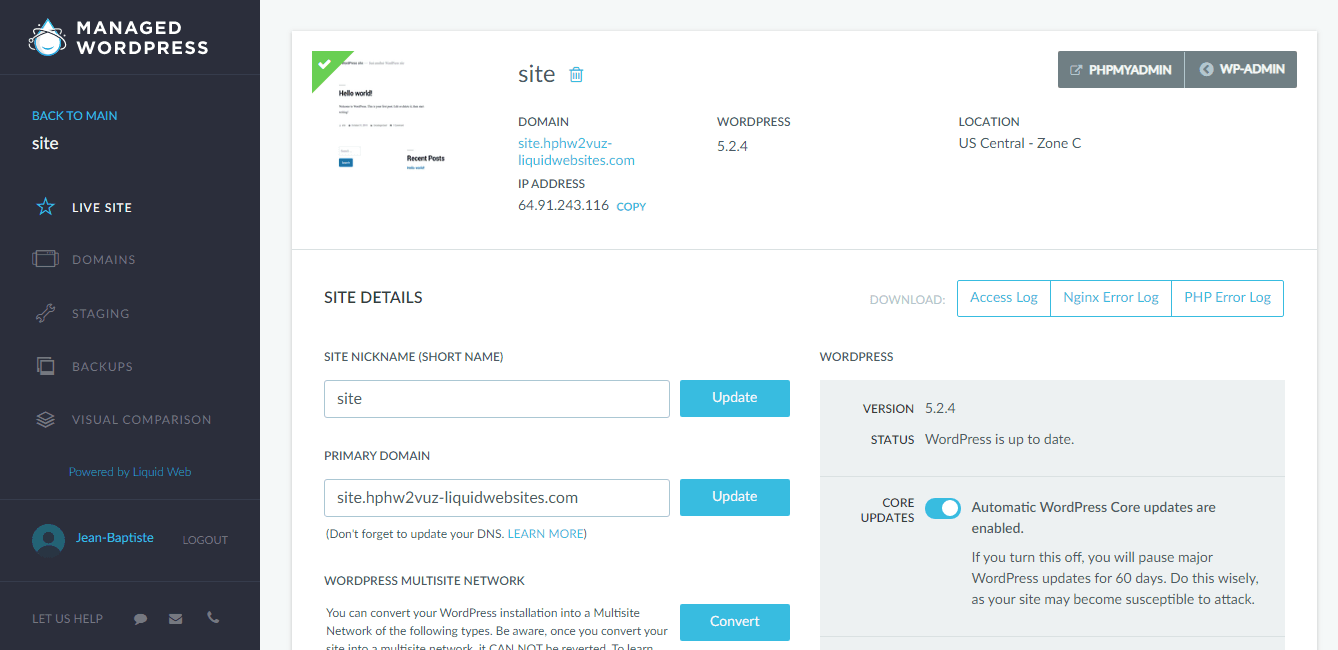
Liquid Web, on the other hand, does not specify using a custom admin panel but provides extensive managed services. This includes proactive management of hosting environments and a comprehensive support system. Liquid Web’s accessibility leans more towards 24/7 human support, rather than a focus on the control panel’s user experience. Liquid Web clients benefit from their support team’s expertise, which can bridge the gap for users who may find technical navigation challenging.
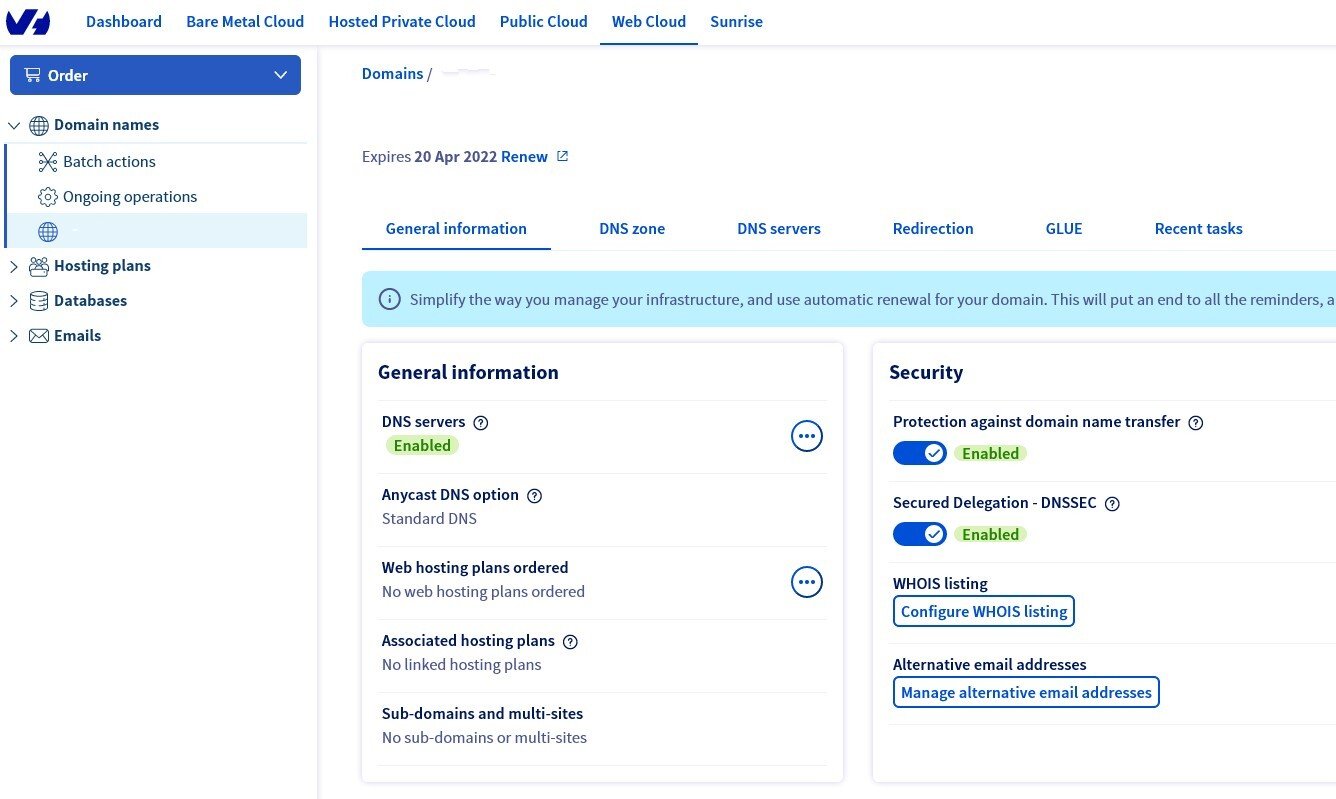
Both OVHcloud and Liquid Web offer site migration services. OVHcloud allows you to move your website files via FTP Explorer, FTP Client, or SSH, providing flexibility depending on user familiarity with these tools. On the other hand, Liquid Web offers dedicated help during the migration process, aiding with site, store, or application transfers. These services are integrated into their managed hosting plans. Liquid Web’s approach ensures continuous support during migration, which can alleviate the stress of manually handling the process.
The help center resources of OVHcloud are extensive, featuring multilingual guides, a community support forum, partner programs, and a dedicated help center with detailed guides on various topics. Liquid Web excels in this area with a well-structured, comprehensive knowledge base containing tutorials, common fixes, and featured articles like web server security best practices and DNS functionality. Both providers offer valuable knowledge bases, but Liquid Web’s promise of a 59-second response for chat and phone support stands out for real-time assistance.
User management
accessibility.
Score Components:
- Role customization (40%): Flexibility in creating and defining user roles and
permissions. - Ease of management (30%): User interface and tools for managing users.
- Access control (20%): Effectiveness of access control measures for different user
levels. - Scalability (10%): Ability to manage a growing number of users efficiently.
 8.9
8.9
 8.3
8.3
🏆 Winner
OVHcloud: Offers comprehensive and flexible user and role management for cloud infrastructure.
When comparing OVHcloud and Liquid Web’s Plesk, both platforms offer diverse capabilities in managing user roles, permissions, and accessibility. OVHcloud provides extensive flexibility by allowing an unlimited number of OpenStack users and a variety of predefined roles such as Administrator, Network Operator, and ObjectStore Operator. Users can be assigned multiple roles, giving precise control over what actions they can execute. Liquid Web’s Plesk, on the other hand, provides a more straightforward yet limited approach with four default roles (Administrator, Webmaster, Application User, and Accountant) and the ability to create custom roles. However, Plesk ties user roles closely to individual domains or subscriptions, which may limit its flexibility compared to OVHcloud’s infrastructure-wide role assignment.
Managing users and roles is made accessible through the respective platforms’ user interfaces. OVHcloud utilizes the OVHcloud Control Panel for role and access management, where users can generate configuration files for tools like OpenStack CLI or Rclone directly. This streamlines setting up new users and their permissions. Liquid Web’s Plesk provides user management through its Subscription settings, accessible via its main menu. The interfaces for both Service Provider View and Power User View in Plesk are intuitive but may feel somewhat restricted to domain-centric management, whereas OVHcloud’s interface feels geared towards broader infrastructure control.
In terms of access control and scalability, OVHcloud stands out due to its ability to handle an unlimited number of users and the ease of modifying roles and permissions as needs evolve. The flexibility in defining and grouping multiple roles ensures that OVHcloud can manage a growing number of users without compromising security or operational efficiency. Liquid Web’s Plesk, while effective for smaller to medium-sized infrastructures, might become cumbersome when scaling due to its domain-specific user role limitations. The ability to quickly disable or enable access in OVHcloud greatly enhances security management, particularly in dynamic environments.
OVHcloud user roles table:
| Role | Description | Access highlights |
|---|---|---|
| Administrator | Full access to the cloud infrastructure and all management functions. | Can manage all cloud resources, including provisioning, networking, and storage systems. |
| Network Operator | Manages network settings and configurations. | Creates and manages networks, subnets, and routers. |
| Infrastructure Supervisor | Oversees the overall infrastructure without modifying settings. | Monitors infrastructure health, usage metrics, and availability without making changes. |
| ObjectStore Operator | Manages object storage services and configurations. | Controls S3 object storage resources, configurations, and access policies. |
| Image Operator | Handles virtual server images. | Creates, manages, and stores virtual server images within the infrastructure. |
| Computer Operator | Manages compute instances and related operations. | Provisions and manages compute resources, including VMs and scaling instances. |
Liquid Web user roles table:
| Role | Description | Access highlights |
|---|---|---|
| Administrator | Full access to Plesk control panel and server management functions. | Can manage all server resources, create users, and adjust critical settings. |
| Webmaster | Manages most aspects of the subscriptions, including creating new sites. | Can configure DNS, mail, and FTP, but cannot manage other Plesk users. |
| Application User | Limited access. | Can use specific applications installed on the hosting account. |
| Accountant | Views subscription details. | Can access subscription information but cannot modify any server or hosting settings. |
Customer support
hosting provider.
Score Components:
- Support communication channels (30%): Measures the variety of customer support types
provided (live chat, chatbot, email, phone, etc.) - Availability (20%): Assesses the availability hours for each channel, including 24/7
support options. - Technical support quality (30%): Assesses whether the provider offers comprehensive
technical support, including hardware upgrades (e.g., HDD to SSD), software installations, and web
server configuration changes. - Enterprise support (20%): Checks if there are dedicated or priority support services
for enterprise-level customers.
 7.6
7.6
 9.4
9.4
🏆 Winner
Liquid Web: Liquid Web provides superior customer support with rapid response times and around-the-clock service.
 |
 |
|
|---|---|---|
Phone support |
||
Live chat support |
||
Chatbot |
||
Email/ticket support |
||
Enterprise support (dedicated agent, priority support) |
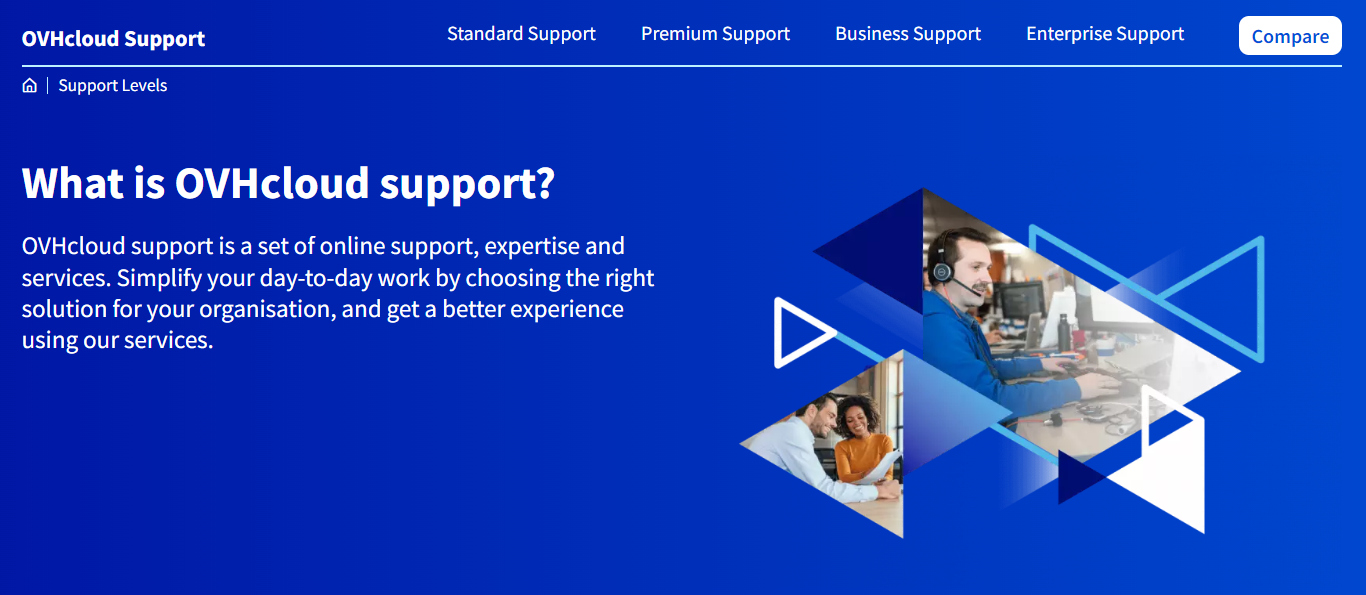
Both OVHcloud and Liquid Web offer comprehensive customer support options but differ significantly in their service levels and response times. OVHcloud provides tiered support plans from standard to enterprise levels, offering options based on the criticality of the hosting environment. Standard support through email and community forums is available for non-critical use, while higher tiers like Enterprise support provide 24/7 access with a 30-minute response time for critical incidents. Nevertheless, high costs and limited availability during specific hours can be a concern for businesses requiring more immediate assistance.
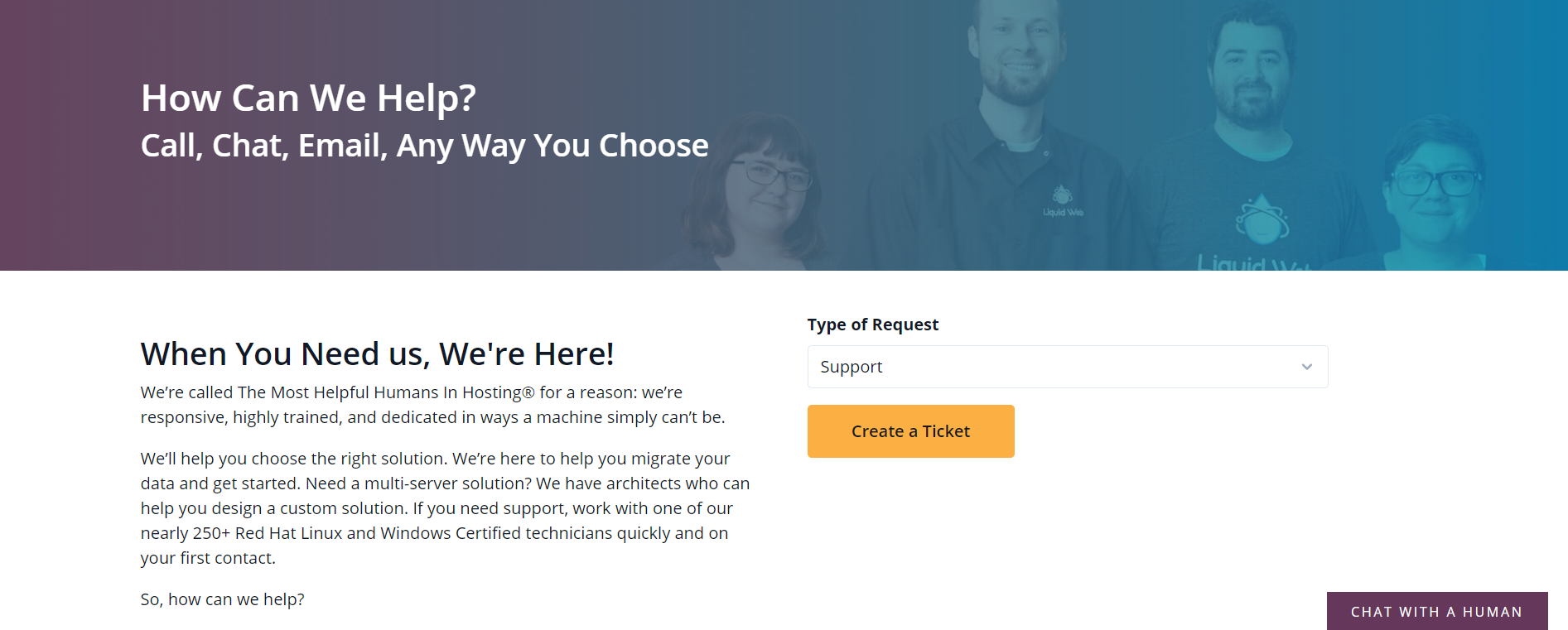
Conversely, Liquid Web stands out with its 24/7/365 customer support available through phone, live chat, and helpdesk, boasting initial response guarantees within 59 seconds for phone and chat, and 59 minutes for helpdesk inquiries. Their Heroic Support® team and managed hosting advisors provide expert assistance across various platforms, ensuring quick and effective resolutions. Liquid Web’s proactive monitoring, migration assistance, and dedicated customer success managers further enhance their appeal to businesses looking for reliable and fast support.
User feedback
User feedback for this hosting provider reveals a stark contrast in experiences. On one hand, users appreciate the competitive pricing, diverse range of services, multiple datacenter locations, and solid server performance when issues do not arise, reflecting a favorable cost-benefit ratio. On the other hand, many users criticize the provider’s customer service, highlighting slow response times, inadequate technical support, and unresolved billing discrepancies, with some experiencing significant delays and lack of assistance in critical situations. Overall, while the hosting services can be robust and reliable, the customer support and service delivery times need considerable improvement.
Customer feedback for this hosting provider is mixed, with significant polarization in user experiences. While some have praised the company for its reliable uptime, exceptional support, and proactive monitoring, others have experienced severe dissatisfaction due to frequent downtimes, unresponsive customer service, and unethical billing practices. Long-term customers, in particular, have noted a sharp decline in service quality and support efficiency, attributing it to recent management changes. Despite positive reviews highlighting excellent technical support and overall reliability, a growing number of users advise against using this provider due to these negative aspects.
FAQ
Which platform is better suited for hosting WordPress websites?
Liquid Web is better suited for hosting WordPress websites as it offers specialized WordPress hosting plans with features like advanced hardware options, NVMe storage, and 24/7 support. OVHcloud does not provide specific WordPress hosting and might not offer the same level of optimized performance for WordPress sites. Therefore, for WordPress hosting, Liquid Web stands out as the superior choice.
Which hosting service offers better security features?
Both OVHcloud and Liquid Web offer robust security features, but Liquid Web may have the edge due to its emphasis on F5 AIP intrusion detection, proactive monitoring, and 30-minute hardware SLA. OVHcloud also provides strong security measures, including anti-DDoS protection and automatic backups, but its past issues with uptime may concern some users. Therefore, Liquid Web appears to provide a more comprehensive security package.
Which platform offers better customer support?
Liquid Web offers superior customer support with a proactive 24/7/365 service, including phone, live chat, and helpdesk support. They guarantee response times within 59 seconds for phone and chat, and 59 minutes for helpdesk inquiries. OVHcloud also provides various support tiers, but its customer service has been criticized for slower response times and limited availability, making Liquid Web the better option for responsive customer support.
Which hosting service offers more scalability options for growing websites?
Liquid Web offers more scalability options for growing websites, including easy upgrades or downgrades of managed VPS services with minimal downtime and free monthly autoscaling. OVHcloud, while offering various vCore and RAM configurations, does not explicitly state automatic resource adjustments. Liquid Web’s detailed upgrade processes and flexible scaling options make it better suited for growing websites.
How do the providers handle email hosting and what features are included?
OVHcloud provides robust email hosting, supporting multiple email addresses depending on the plan, with up to 1000 email addresses in higher-tier plans. Liquid Web not only offers email hosting but also provides features tailored for transactional emails and reselling third-party services like Google Workspace and Outlook. This makes Liquid Web an appealing choice for larger enterprises or those requiring extensive email service integrations.
The making of this blog
We followed a clear, step-by-step process to write and research this article.









